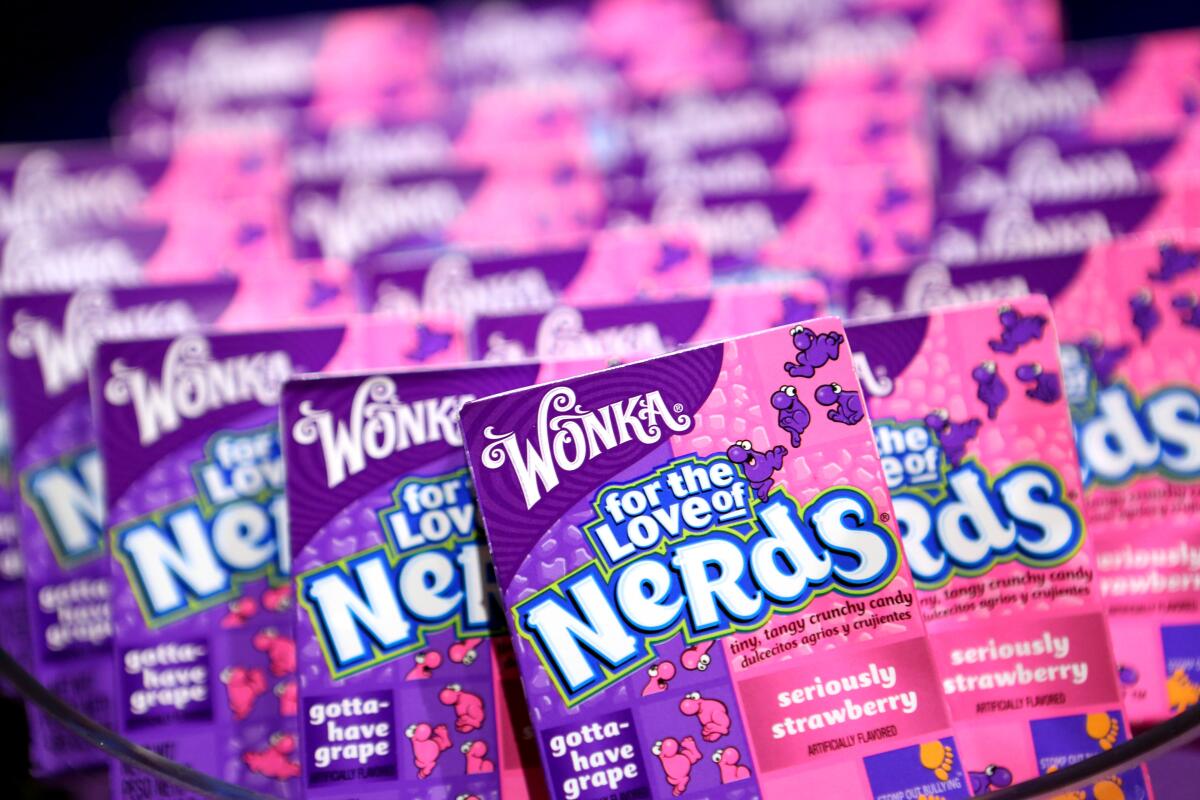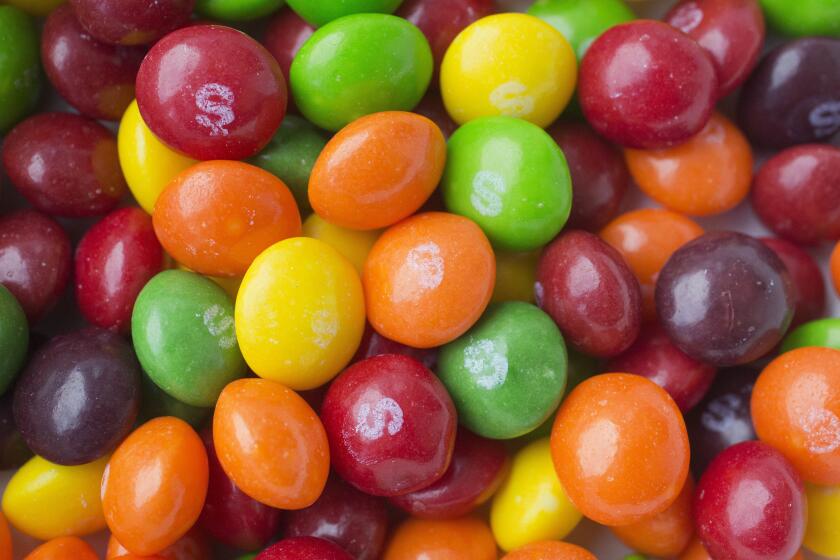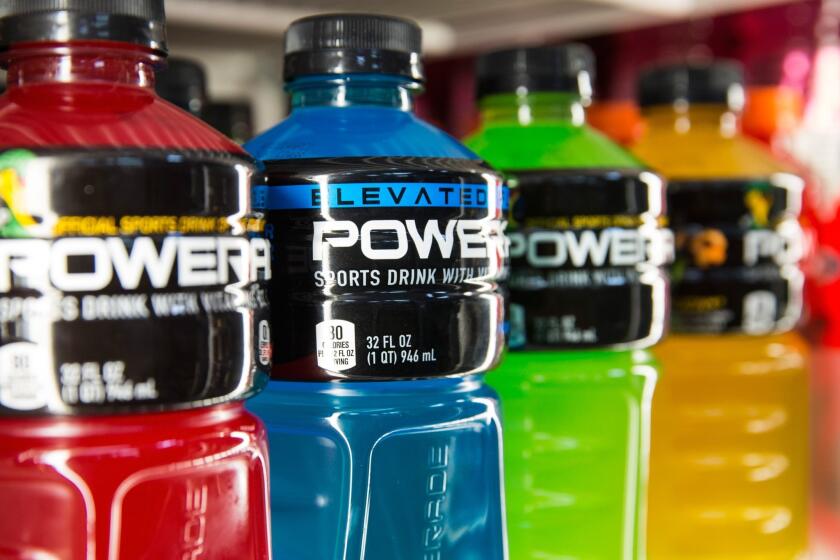California bill targeting ‘toxic’ chemicals in Skittles, other snacks passes first hurdle

- Share via
A first-of-its-kind law that would ban the use of certain ingredients and dyes linked to cancer and other health issues in processed foods and drinks is now closer than ever to becoming reality in California.
Assembly Bill 418, introduced by Assemblymembers Jesse Gabriel (D-Woodland Hills) and Buffy Wicks (D-Oakland), would ban the manufacture, sale and distribution of foods containing red dye No. 3, titanium dioxide, potassium bromate, brominated vegetable oil, or propylparaben — starting in 2025.
Popular food items that contain any of those five substances include Crush Orange Soda, Mountain Dew, some Betty Crocker icings and sprinkles, and an array of Hostess snacks, according to a list maintained by the nonprofit Environmental Working Group, a supporter of the legislation.
States across the U.S., including California, Washington and New York, have passed bills banning some chemicals from being purposely added to food packaging. This latest bill, which cleared the California State Assembly this week, would be the first in the nation to ban chemicals intentionally added to foods as preservatives or to enhance colors and flavors.
“This legislation will protect kids, families and consumers in California from some really toxic chemicals with well-documented risks of harm,” Gabriel said during an interview Tuesday.
A California ban on red dye No. 3, titanium dioxide and other chemicals found in thousands of food items would be the first among the states.
Companies found to be in violation could be fined up to $5,000 for the first offense and $10,000 for each subsequent infraction, according to the bill text.
The bill passed the Assembly by a largely party-line margin, with most Democrats in support and Republicans either opposed or not voting. The measure now heads to the state Senate, with committee hearings expected over the next few weeks.
Under the proposed law, companies with food and beverages containing these specified chemicals, such as the candies Starburst and Peeps, will be required to modify their recipes for products sold in California. These chemicals tend to be found in baked goods, and in candies and foods marketed to kids and communities of color, such as Skittles and Nerds, Gabriel said.
The legislation is modeled after existing laws in Europe that already ban and require alternatives to the five chemicals, which are linked to increased risk of cancer, reproductive and immune system issues, as well as behavioral and developmental issues in children, according to Scott Faber, senior vice president of government affairs at the Environmental Working Group.
“They stepped in to ban the worst of the worst chemicals — the chemicals that not only have clear evidence of health harm, but those that have obvious safer and less expensive alternatives,” Faber said.
A proposed California law would ban the sale of foods, including Skittles and other snacks, that contain certain ‘dangerous chemicals.’
A 2021 report by the California Environmental Protection Agency evaluated the potential impacts of seven synthetic food dyes approved by the U.S. Food and Drug Administration — including red dye No. 3 — and found they were associated with adverse neurobehavioral outcomes in some children, such as memory and learning difficulties. Kids had varying degrees of sensitivity.
According to the report, dyes are added to foods, over-the-counter medications, and vitamins targeted at children, with the highest exposures usually from juice and soft drinks.
“There are major weaknesses in the FDA approval process,” Gabriel said.
Faber said chemical and food manufacturing companies have bypassed regulatory reviews of additives in foods through the FDA’s Generally Recognized as Safe standards, which state that a substance does not need additional review if it has been “adequately shown to be safe under the conditions of its intended use.” According to an analysis by EWG, 99% of the chemicals that have entered commerce since 2000 were reviewed by the food and chemical industry.
“Everyone assumes that the food we bring to our families is safe, and everyone assumes that the FDA is reviewing all of the chemicals that are added to our food for safety,” Faber said. “Unfortunately, that’s not the case.”
Environmental and health groups are pushing fast-food companies, supermarket chains and other retail outlets to remove PFAS from their packaging.
In an email, the FDA said it monitors and authorizes the use of food ingredients to ensure they are safe.
“All the substances in California Bill 418 have been evaluated by the FDA,” the agency’s statement continued. “When we identify new data and information that indicates the use of an ingredient is unsafe, we take steps to protect public health — which can include revoking authorizations or approvals for certain uses, working with industry on voluntary market phase-out agreements and recalls, issuing alerts and informing consumers.”
Assembly Bill 418 has a number of opponents, including the Consumer Brands Assn., the International Assn. of Color Manufacturers, the National Confectioners Assn., and the American Bakers Assn.
“The California Assembly is well-intentioned, but this is not the right way to do it,” Christopher Gindlesperger, senior vice president of public affairs and communications for the National Confectioners Assn., wrote in an email to The Times. “We should be relying on the science-based rigor of the federal regulatory process and avoiding a state-by-state patchwork approach related to food additives and ingredients.”
In a statement posted online, the International Assn. of Color Manufacturers said no regulatory authority “has found credible safety concerns with these additives,” and that banning red dye No. 3 and titanium dioxide would unnecessarily override established safety standards.
Gabriel said the legislation isn’t intended to ban products.
“I would vote against a bill that would ban Skittles or any candy. That’s a personal decision,” Gabriel said. “What we want these companies to do is make minor modifications to their recipes with safer, readily available alternatives.”
Coca-Cola announced that it will stop using brominated vegetable oil, an ingredient that is a patented flame retardant for plastics, in its Powerade sports drink.
Companies like Coca-Cola, Pepsi, Panera Bread, and Dunkin’ have already stopped using some of these chemicals, Gabriel said.
“This would basically require those who haven’t made that responsible decision to switch to those safer alternatives,” he added.
Gabriel said if California passes this legislation, it could prompt a nationwide transition.
“They’re not going to have one recipe for California and a different recipe for Oklahoma,” Gabriel said. “Companies are going to make changes to their recipes and kids across the U.S. are going to be safer. We don’t love our kids here any less than they do in Europe. It’s time that our laws reflect that.”
More to Read
Sign up for Essential California
The most important California stories and recommendations in your inbox every morning.
You may occasionally receive promotional content from the Los Angeles Times.















